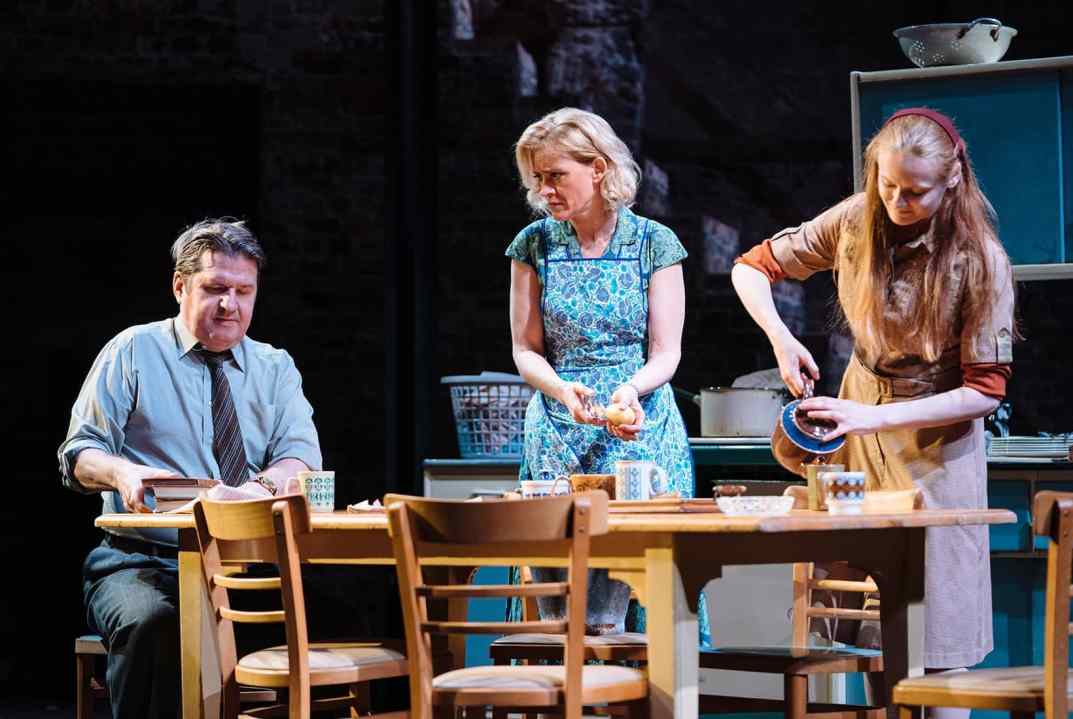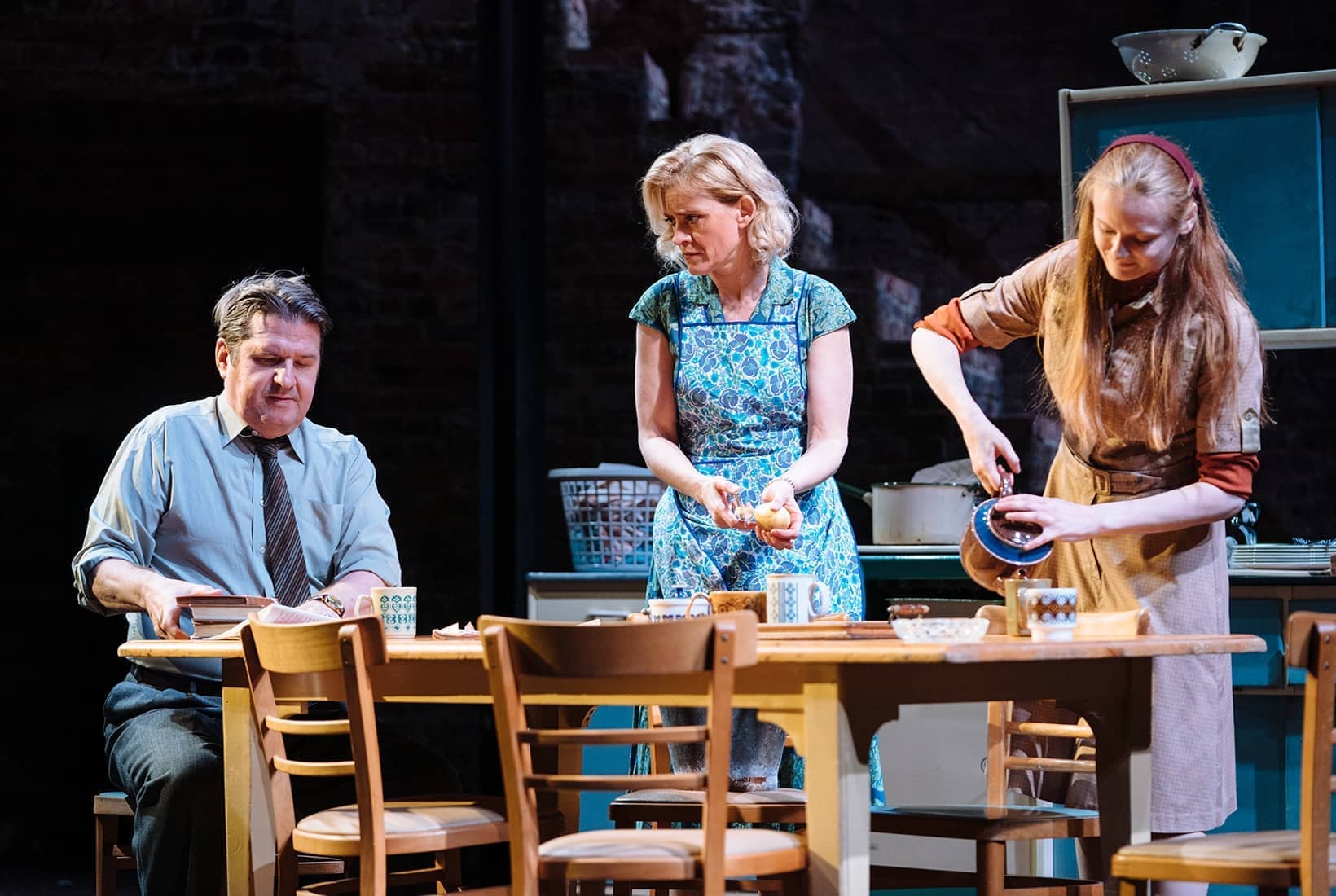The House of Shades is a state-of-the nation play that covers the past six decades of grinding poverty in Nottingham. The action opens in 1965 with a corpse being sponged down by an amusingly saucy mortician. The dead man, Alistair, sits up and walks into the kitchen where he natters with his prickly, loud-mouthed wife, Constance (Anne-Marie Duff). They seem to live in the city’s most dangerous dwelling. People keep dying. Then they come back to life to make a speech or two. Constance’s pregnant daughter doesn’t survive a back-room abortion and she shows up half a dozen times in a skirt dripping with blood. Alistair expires again and returns to life to tell us what it’s like to die. How the writer, Beth Steel, researched this experience isn’t clear. We have to take her word for it. Nye Bevan’s ghost shows up on a turnip patch and he explains that democracy can alleviate poverty by attacking property. Thanks, Nye. Very interesting. Granny collapses of something or other and returns from the dead to reveal that her career as an ill-paid skivvy was no better than being a ghost. Cheers, Gran. Sorry to hear that.
On and on this shapeless muddle grinds. Every half-hour or so the action leaps forward to a new decade. The chippy, witless dialogue seems to have been lifted from old Coronation Street episodes: ‘I’m the man in this house… you should be ashamed of yourself… marrying you was the worst mistake I ever made.’ The aggressive banalities are interspersed with heavy-handed references to political issues. Inflation, unemployment, privatisation and mine closures are mentioned but never properly examined. The level of analysis would bore a 12-year-old. A character in 1996 tells us that Tony Blair stands a good chance of becoming prime minister. Really? Who knew that? Each political controversy seems to anger every member of the household and they descend into foul-mouthed ranting and violence. It’s an odd way to characterise Labour’s grass roots: drunken screaming halfwits trying to kick each others’ teeth in. Perhaps that’s how Islington views Nottingham.
It’s hard to believe that a serious producer thought this apprentice-piece was ready to be staged
Some reviewers have praised Constance as an archetypal rebel, like Joan of Arc, but really she’s just a pretentious drunk who hates her kids and humiliates her husband in public. She can’t stop quoting Bette Davis and she harbours a weird ambition to work as a nightclub singer. The play keeps grinding to a halt so that Constance can change into a spangly frock and warble at us through a microphone. Great fun for the actress. Boring for the audience. And terrible for the drama which seizes up during these karaoke breaks. It’s not even clear if the songs are dream sequences or sincere attempts by Constance to become a crooner. The stagecraft is inept and careless throughout. Too many scenes end with a handful of climaxes where one would do. The writer doesn’t need a ghost, a house fire and a punch-up to bring a piece of action to a close. But she thinks she does. A writing coach might help.
Some scenes are so off-key it’s funny. In 1979 we meet an Asian woman who runs a bike shop and speaks fluent American. ‘May I use your bathroom?’ she says. Back then, no one said ‘bathroom’ to mean ‘loo’. And the phrase ‘kicks in’ to mean ‘starts’ didn’t arrive until decades later. If the writer doesn’t know her period she should ask someone who does. The accents are wonky too – more Yorkshire than Nottingham. It’s hard to believe that a serious producer thought this rambling apprentice-piece was ready to be staged. The Almeida needs to act like a proper theatre and not an amateur dramatics society for Arts Council trustafarians.
It would be a surprise if Grease the Musical could rival the 1978 movie, which burned itself into the memory of anyone who saw it the first time around. On stage, the gang of lads are less than wonderful. Too thuggish, too arrogant. Lacking in basic schoolboy charm. The girls are better but their roles are more interestingly written. The actors are already adding tired, mannered gestures as if the show had been running for 1,000 performances. More freshness is needed. Olivia Moore (Sandy) reaches dazzling heights in her weepy solo ballad, ‘Hopelessly Devoted to You’.
She’s the star of the show until Peter Andre arrives as Vince Fontaine. He only appears ‘at certain performances’, whatever that means, but he electrifies the crowd for a few brief moments on stage. Andre can move and dance and sing better than the rest. Plus, he knows he’s a star and he projects his magical aura into the farthest nooks of this enormous stadium. Why isn’t he the lead? On paper he’s too old to play a teenager but so was Travolta. He’s just the elixir this show needs. Make him Danny.








Comments